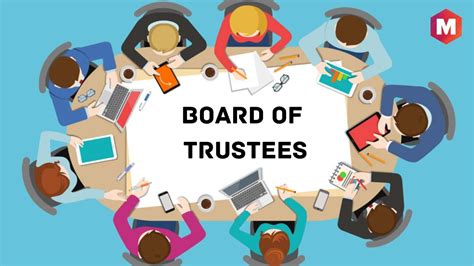A board of trustees is a group of individuals who are elected or appointed to oversee the affairs of a non-profit organization, such as a school, hospital, or charity. The board is responsible for ensuring that the organization is operating in accordance with its mission and values, and that it is meeting its legal and fiduciary obligations.

How Are Boards of Trustees Governed?
Boards of trustees are typically governed by a set of bylaws, which outline the board’s structure, responsibilities, and procedures. The bylaws may also specify the qualifications required for board members, the terms of their service, and the process for removing board members.
The chairman of the board of trustees is typically responsible for presiding over board meetings and ensuring that the board is operating in accordance with its bylaws. The chairman may also represent the board in dealings with outside organizations and individuals.
Key Roles and Responsibilities
The key roles and responsibilities of a board of trustees include:
- Ensuring that the organization is operating in accordance with its mission and values
- Setting strategic goals for the organization
- Overseeing the organization’s financial affairs
- Ensuring that the organization is meeting its legal and fiduciary obligations
- Evaluating the performance of the organization’s management team
- Representing the organization to outside stakeholders
Common Structures and Models
There are many different types of board of trustees structures and models. The most common structure is a single board, which consists of a group of individuals who are elected or appointed to serve as trustees. However, some organizations have a two-tiered board structure, which consists of a board of directors and a board of trustees. The board of directors is typically responsible for the day-to-day operations of the organization, while the board of trustees is responsible for overseeing the board of directors and ensuring that the organization is meeting its long-term goals.
Benefits of Board Membership
There are many benefits to serving on a board of trustees. These benefits include:
- The opportunity to make a difference in the community
- The opportunity to learn about new areas of interest
- The opportunity to network with other business leaders
- The opportunity to enhance your leadership skills
Challenges of Board Membership
There are also some challenges associated with serving on a board of trustees. These challenges include:
- The time commitment required
- The potential for liability
- The need to make difficult decisions
Trends in Board Governance
There are a number of trends in board governance that are worth noting. These trends include:
- The increasing diversity of boards of trustees
- The increasing use of technology in board meetings
- The increasing focus on risk management
The Future of Board Governance
The future of board governance is likely to be shaped by a number of factors. These factors include:
- The increasing complexity of the business environment
- The growing importance of technology
- The changing expectations of stakeholders
How to Get Involved in Board Service
If you are interested in serving on a board of trustees, there are a few things you can do to get started:
- Attend board meetings as a guest
- Volunteer your time to the organization
- Network with other business leaders
- Get involved in your community
Conclusion
Boards of trustees play a vital role in the governance of non-profit organizations. By understanding the role of boards of trustees, you can make a more informed decision about whether or not to serve on a board.
